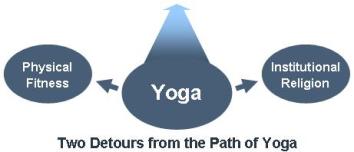Yoga – Is It a Religion? (Part 1)
7 March 2017Yoga is in Religion. Religion is not in Yoga … Swami J.
While Yoga may be found in many religions, the numerous yoga practices involving body, breath and mind, along with their transcendent goal of direct experience, are generally neither characteristic of any particular religion, nor typically practiced by the adherents of any religion.
Yoga means “union.” It is the joining together the aspects of ourselves which were never divided in the first place.
To say that the word yoga itself is a religion makes about as much sense as saying that the words “union” or “holistic” constitute a religion.

Keep in mind that there is not universal agreement on these points, or even the definition of yoga for that matter. Although there are many people who feel that yoga is not a religion, there are also those who feel that yoga is a religion.
So this begs the question; what's in religion that’s missing with Yoga? Here are a few things:
- Yoga has no deity to worship.
- Yoga has no worship services to attend.
- Yoga has no rituals to perform.
- Yoga has no sacred icons.
- Yoga has no creed or formal statement of religious belief.
- Yoga has no requirement for a confession of faith.
- Yoga has no ordained clergy or priests to lead religious services.
- Yoga has no institutional structure, leader or group of overseers.
- Yoga has no membership procedure.
- Yoga has no congregation of members or followers.
- Yoga has no system of temples or churches.
To point out that Yoga is not religion (or that yoga is in religion, but religion not in yoga), is just stating facts, but these facts are not opposed to religion. Suggestion that one should or should not practice religion is not what is being described here. Religion can be extremely useful, and there are those who would say it’s absolutely essential. Nonetheless anyone can practice yoga, and do so either with or without religion being involved.
Practitioners of yoga tend to be very clear about yoga not conflicting with any religion. However, there are many thousands of denominations and sects within many diverse religions. Some of these groups have religious beliefs that might seem very different to another’s beliefs.
Some say that certain foods should be eaten for example, while others say that the same food item should not be eaten. Some suggest polygamy, while others require monogamy. Some agree with medical treatment, while others say that healing is solely God’s job, and that faith, not modern medical treatment should be employed. Some believe in social freedoms, while others believe more in strict religious discipline.
Then there are those basic practices like calming the autonomic nervous system through diaphragmatic breathing that some consider to be of a different religion, while others see this as a universal human process from which anyone can benefit. Some others consider making the body flexible to be a part of religion, while others see it is physical fitness, while still others see it as a part of systematic, non-sectarian meditation. So while some of the customs of various religions may seem odd to the others, these are the realities of the diversity of humanity.
Emphasizing this diversity in this article is not intended to resolve these issues, or to offer a solution. However, it seems useful to accept that, to some degree, there are people who consider yoga to be religion, even though we may feel certain that it is not. After all, it is always appropriate to respect (and honor) the choice of others.
Coming next, part 2 of "Yoga – Is It a Religion?"
Rae Indigo is ERYT 500
Archives
- June 2019
- March 2017
- February 2017
- January 2017
- December 2016
- November 2016
- October 2016
- July 2016
- June 2016
- May 2016
- April 2016
- March 2016
- February 2016
- January 2016
- December 2015
- November 2015
- October 2015
- September 2015
- August 2015
- May 2015
- April 2015
- February 2015
- December 2014
- November 2014
- October 2014
- September 2014
- August 2014
- March 2014
- February 2014
- January 2014
- December 2013
- November 2013
- October 2013
- September 2013
- August 2013
- July 2013
- June 2013
- May 2013
- April 2013
- March 2013
- February 2013
- January 2013
- December 2012
- November 2012
- September 2012